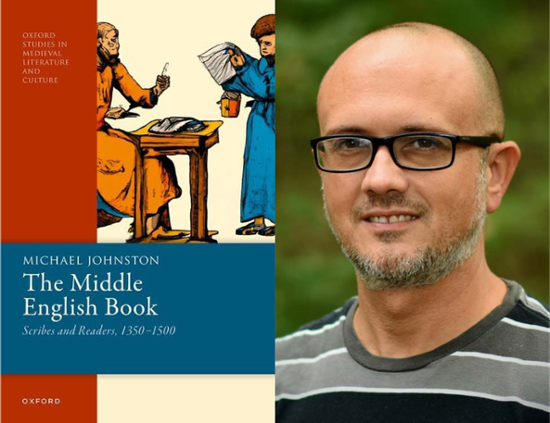Featured Publication: The Middle English Book

Publication Title
The Middle English Book: Scribes and Readers, 1350-1500
Author
Publisher
Oxford University Press
Publication Date
November 2023
About the Book (from the publisher)
The monograph series Oxford Studies in Medieval Literature and Culture showcases the plurilingual and multicultural quality of medieval literature and actively seeks to promote research that not only focuses on the array of subjects medievalists now pursue--in literature, theology, and philosophy, in social, political, jurisprudential, and intellectual history, the history of art, and the history of science--but also that combines these subjects productively. It offers innovative studies on topics that may include, but are not limited to, manuscript and book history; languages and literatures of the global Middle Ages; race and the post-colonial; the digital humanities, media and performance; music; medicine; the history of affect and the emotions; the literature and practices of devotion; the theory and history of gender and sexuality, ecocriticism and the environment; theories of aesthetics; medievalism.
The Middle English Book addresses a series of questions about the copying and circulation of literature in late medieval England: How do we make sense of the variety of manuscripts surviving from this period? Who copied and disseminated these diverse manuscripts? Who read the literary texts that they transmit? And what was the relationship between those copying literature and those reading it? To answer these questions, this book examines 202 literary manuscripts from the period 1350 to 1500. First, this study suggests that most surviving manuscripts fall into four categories, depending on the proximity and relationship of that manuscript's scribes and readers. But beyond proposing these new categories, this book also looks at the history of writing practices, and demonstrates the ubiquity of bureaucracies within late medieval England. As a result, The Middle English Book argues that literary production was a decentered affair, one that took place within these numerous, modest, yet complex, bureaucracies. But this book also argues that, because literary production arose in such scattered bureaucracies, manuscripts were local products, produced within the cultural and economic milieu of their users. Manuscripts thus form a fundamentally different sort of cultural artifact than the printed books with which we are familiar--a form of centralized, urbanized, and commercialized textual production that was just over the historical horizon in late medieval England.
About the Author
Michael Johnston, associate professor of English, earned a BA in English and Religious Studies from John Carroll University in 2000, a M.Litt. in Mediaeval English from the University of St Andrews in 2002, and a PhD from Ohio State University in 2007. He is Associate Professor of English at Purdue University and he researches and teaches about literature and culture in late medieval England, with a specialization in the history of the book and Piers Plowman.